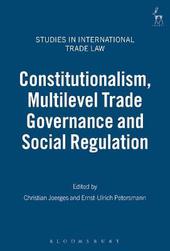
|
Constitutionalism, Multilevel Trade Governance and Social Regulation
Hardback
Main Details
| Title |
Constitutionalism, Multilevel Trade Governance and Social Regulation
|
| Authors and Contributors |
Edited by Christian Joerges
|
|
Edited by Ernst-Ulrich Petersmann
|
| Series | Studies in International Trade and Investment Law |
|---|
| Physical Properties |
| Format:Hardback | | Pages:566 | | Dimensions(mm): Height 234,Width 156 |
|
| ISBN/Barcode |
9781841136653
|
| Classifications | Dewey:343.087 |
|---|
| Audience | | Undergraduate | | Postgraduate, Research & Scholarly | | Professional & Vocational | |
|---|
|
Publishing Details |
| Publisher |
Bloomsbury Publishing PLC
|
| Imprint |
Hart Publishing
|
| Publication Date |
19 October 2006 |
| Publication Country |
United Kingdom
|
Description
This is a book about the ever more complex legal networks of transnational economic governance structures and their legitimacy problems. It takes up the challenge of the editors' earlier pioneering works which have called for more cross-sectoral and interdisciplinary analyses by scholars of international law, European and international economic law, private international law, international relations theory and social philosophy to examine the interdependences of multilevel governance in transnational economic, social, environmental and legal relations. Two complementary strands of theorising are expounded. One argues that globalisation and the universal recognition of human rights are transforming the intergovernmental "society of states" into a cosmopolitan community of citizens which requires more effective constitutional safeguards for protecting human rights and consumer welfare in the national and international governance and legal regulation of international trade. The second emphasises the dependence of the functioning of international markets and liberal trade on governance arrangements which respond credibly to safety and environmental concerns of consumers, traders, political and non-governmental actors. Enquiries into the generation of international standards and empirical analyses of legalization and judizialisation practices form part of this agenda. The perspectives and conclusions of the more than 20 contributors from Europe and North-America cannot be uniform. But they converge in their search for a constitutional architecture which limits, empowers and legitimises multilevel trade governance, as well as in their common premise that respect for human rights, private and democratic self-government and social justice require more transparent, participatory and deliberative forms of transnational "cosmopolitan democracy".
Author Biography
Christian Joerges is Professor of Economic Law at the European University Institute, Florence. He is on leave from the University of Bremen where he was a Director of the Centre for European Law and Policy. Ernst-Ulrich Petersmann is Professor of International and European Law at the European University Institute at Florence and Joint Chair at the Robert Schuman Centre for Advanced Studies in Florence, Italy. He was formerly Professor at the University of Geneva and its Graduate Institute of International Studies, and legal adviser in GATT and the WTO
ReviewsThis book makes a substantial contribution...It is essential reading for all scholars and students interested in the mind-boggling challenges and complexities of multilayered governance for democracy in a world of globalised markets...All the papers, in their own way, offer rich insights from very different angles...For the lawyer, the contributions by political scientists are particularly helpful in understanding the doctrine of legitimacy and deliberative democracy. They assist in advancing legal thinking. The same is likely true for the legal papers, which could assist the political scientist and economist in coming to grips with the complexities of multilevel trade governance. -- Thomas Cottier * Journal of International Economic Law * The arguments, findings and suggestions are of such richness in advancing the knowledge of interconnections between various layers and sources of law in balancing trade and market liberalization with non-economic considerations, that the reader will be in the position to increasingly appreciate this project only after repeated reading. And he/she will never be disappointed by the inspiration which the book sparks on the international/trans-national constitutionalism discourse. -- Luca Rubini * Common Market Law Review, Volume 44, Issue 5 *
|